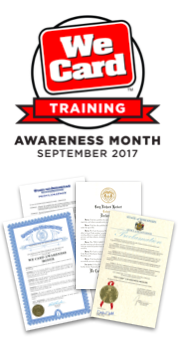The We Card Program examined the learning styles of frontline employees who have taken We Card training. According to the Journal of Engineering Education, learning styles have been described as "relatively stable indicators of how learners perceive, interact with, and respond to the learning environment." Because learning styles can also be described as preferences, you can look at them as a description of how learners would choose to receive instruction if given the option.
Here's what we learned about frontline employees' learning styles. Seventy-five percent of frontline employees were visual rather than verbal learners; 69% were active as opposed to reflective learners, 79% were sequential instead of global learners and 84% were intuitive rather than sensitive learners.
So how did We Card put this information to use?
We Card online training features a mix of verbal and visual learning. To appeal to visual learners, screens include high-resolution photos of retailers, customers, store environments, We Card signage and materials and are designed to make it easy for the learner to navigate to the information they need to succeed. To appeal to verbal learners, you'll hear the voice of Al, the store manager, who serves as "the guide on the side" as learners move through the training.
And because practice makes perfect, We Card training uses interactive simulations like the Age Calculation Exercise so active learners can "learn by doing". To appeal to reflective learners, simulations are often followed by opportunities to consider why one approach is better than another as in the Handling Difficult Situations Exercise.
Because sequential learners prefer to learn in a step-by-step fashion, We Card ensures that information is delivered in blocks that build a solid understanding of the responsible tobacco retailing process. For global learners, We Card training explains why responsible tobacco retailing is important so they understand why each step should be followed. For example, We Card's Employee Training Course emphasizes the importance of avoiding the words "I can't." when refusing a tobacco sale by explaining that using the phrase can often lead to unwanted confrontations with customers.
For intuitive learners, We Card Training emphasizes that employees should Think 27 because 1) deciding whether a customer is under 27 years of age is easier than guessing whether a customer is old enough to buy tobacco products and 2) "under 27" carding is now an FDA requirement. In the Guess My Age Game, learners are challenged to guess the ages of some customers and decide whether other customers are under or over 27 years of age and discover for themselves that Think 27 is a better way.
Regardless of your learning style, We Card has the training tools to ensure that you can acquire the knowledge, skills and abilities needed to prevent illegal sales of tobacco to minors. Visit wecard.learningcart.com to take We Card's award-winning eLearning and make sure you - and all of the employees at your store - are prepared.
And if you'd like to find out what kind of learner you are, visit *
http://www.vark-learn.com/english/page.asp?p=questionnaire
(* Please note: The We Card Program, Inc. is not affiliated with Vark-Learn, but rather is providing this as a helpful link and encourages readers to learn more about their learning style).
© Copyright - The We Card Program 2011, All Rights Reserved





